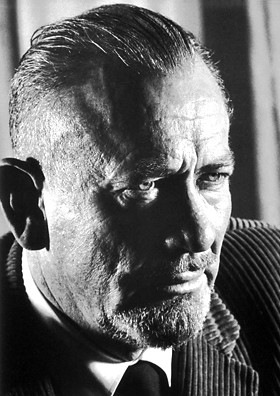  |
“I have always lived violently, drunk hugely, eaten too much or not at all, slept around the clock or missed two nights of sleeping, worked too hard and too long in glory, or slobbed for a time in utter laziness. I've lifted, pulled, chopped, climbed, made love with joy and taken my hangovers as a consequence, not as a punishment.”
"I am happy to report that in the war between reality and romance, reality is not the stronger.”
“I was born lost and take no pleasure in being found.”
I read this book over my Christmas break in my Junior year of High School because my parents gave me a nice hardcover edition as a present. I have read The Grapes of Wrath, The Pearl, Of Mice and Men and The Moon is Down, but Travels with Charley is by far my favorite, well The Grapes of Wrath is great too. This book is by far the most personable and fun to read out of all the listed Steinbecks. It follows his travels across the United States with his dog-friend Charley. He starts in Long Island, and circumvents his way, counter-clockwise, around the entire border of the country, a journey over 10,000 miles. His ride is a customized truck with living space in the bed, that he affectionately names Rocinante after Don Quixote's steed. This book could bring about the adventurous side in any reader by explaining all that the United States has to offer, from the seashore and lighthouses in Maine, to the Redwood forests in California, and the strong unified culture within Texas (a culture which he attributes characteristics similar to a religion). In most of Steinbeck's novels he portrays America, he reports on its activities, and more than anything else it's people. He does the same thing within this book, but he can without any of the fluff of fiction, and reports things just as he sees them in his travels. As a dog lover, this book was made exponentially better by the constant presence of his sweet, intellectual, and regal French poodle. Steinbeck noted that he went on this venture in order to see all of America, the America that he has been writing and reporting on for most of his life. Upon further investigation I learned that he went on this final trip across America at the end of his life, when heart problems could have killed him any day. This was not just a casual strut across the country, taking in the sights and the experiencing life, this was a man saying a final farewell to his beloved home. 4.75/5
I have a hard time giving 5/5 on a book, but this is one of my all-time favorites, so it got pretty darn close.

